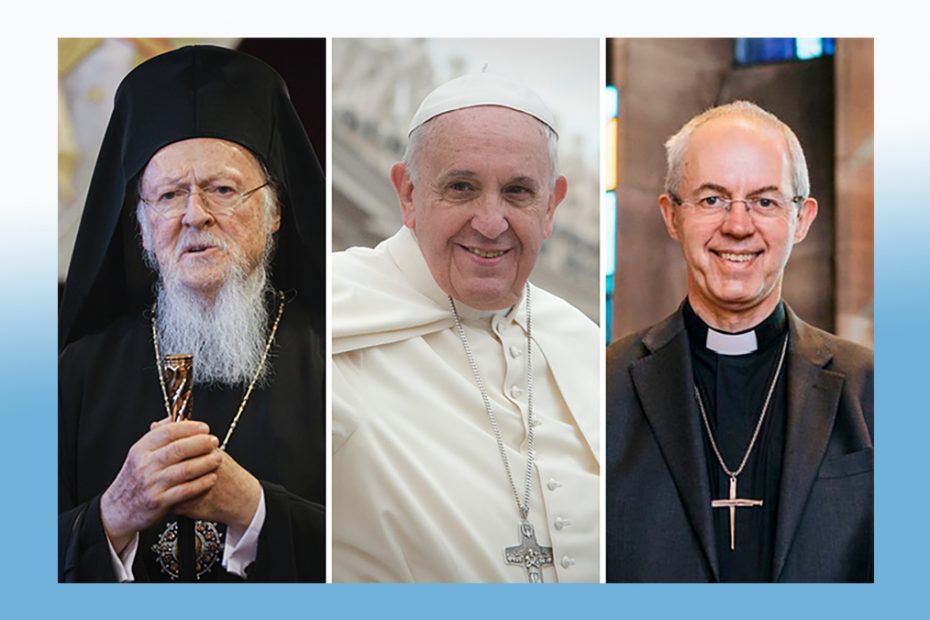Pope Francis, the Ecumenical Patriarch Bartholomew and the Archbishop Justin Welby of Canterbury have released a joint statement for the first time, focusing on the protection of Creation and highlighting the importance of the COP26 meeting in November.
Released on 1 September, the beginning of Season of Creation, this ecumenical statement acknowledges the lessons of the pandemic and urges, “May we not waste this moment. We must decide what kind of world we want to leave to future generations. God mandates: ‘Choose life, so that you and your children might live’ (Dt 30:19).
“We must choose to live differently; we must choose life.”
The statement highlights the COP26 gathering in November multiple times as a key moment for decision makers, “We pray for our leaders who will gather in Glasgow to decide the future of our planet and its people…To those with more far-reaching responsibilities—heading administrations, running companies, employing people or investing funds—we say: choose people-centred profits; make short-term sacrifices to safeguard all our futures; become leaders in the transition to just and sustainable economies. ‘To whom much is given, much is required.’ (Lk 12:48)”
“Accordingly, as leaders of our Churches, we call on everyone, whatever their belief or worldview, to endeavour to listen to the cry of the earth and of people who are poor, examining their behaviour and pledging meaningful sacrifices for the sake of the earth which God has given us.”
When speaking about the environmental crisis, they describe it both as a ‘harsh justice’ and a ‘profound injustice’. “We stand before a harsh justice: biodiversity loss, environmental degradation and climate change are the inevitable consequences of our actions, since we have greedily consumed more of the earth’s resources than the planet can endure. But we also face a profound injustice: the people bearing the most catastrophic consequences of these abuses are the poorest on the planet and have been the least responsible for causing them.”
“We have maximised our own interest at the expense of future generations. By concentrating on our wealth, we find that long-term assets, including the bounty of nature, are depleted for short-term advantage… Now, in this moment, we have an opportunity to repent, to turn around in resolve, to head in the opposite direction … climate change is not only a future challenge, but an immediate and urgent matter of survival.”
The leaders also acknowledge the damage of past and present selfishness which is now affecting the youth and future generations who will bear the brunt of the crisis in coming decades:
“Today’s children and teenagers will face catastrophic consequences unless we take responsibility now.”
“For their sake, we must choose to eat, travel, spend, invest and live differently, thinking not only of immediate interest and gains but also of future benefits. We repent of our generation’s sins. We stand alongside our younger sisters and brothers throughout the world in committed prayer and dedicated action for a future which corresponds ever more to the promises of God.”
The trio propose a changing of perspective to see each other as brothers and sisters, in line with Fratelli Tutti. “If we think of humanity as a family and work together towards a future based on the common good, we could find ourselves living in a very different world. Together we can share a vision for life where everyone flourishes. Together we can choose to act with love, justice and mercy. Together we can walk towards a fairer and fulfilling society with those who are most vulnerable at the centre.”
Finally, they ask each person, church and community to make commitments and live them out for the sake of one another and our world.
“Each of us, individually, must take responsibility for the ways we use our resources. This path requires an ever-closer collaboration among all churches in their commitment to care for creation. Together, as communities, churches, cities and nations, we must change route and discover new ways of working together to break down the traditional barriers between peoples, to stop competing for resources and start collaborating.”
“Caring for God’s creation is a spiritual commission requiring a response of commitment. This is a critical moment. Our children’s future and the future of our common home depend on it.”
The full statement can be found here:
Photo Credit: Anglican News, Jeffrey Bruno and Lambeth Palace
